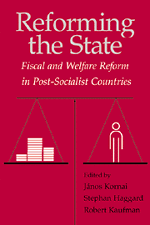Book contents
- Frontmatter
- Contents
- List of Tables and Figures
- List of Contributors
- Preface
- Introduction
- Part I Fiscal Policy and Institutions
- 1 The Politics of Labor-Market Adjustment: The Case of Russia
- 2 Creating Effective Tax Administrations: The Experience of Russia and Georgia
- 3 Politics, Institutions, and Macroeconomic Adjustment: Hungarian Fiscal Policy Making in Comparative Perspective
- 4 Brothers-in-Arms or Rivals in Politics? Top Politicians and Top Policy Makers in the Hungarian Transformation
- Part II The Welfare State
- Appendix
- Index
4 - Brothers-in-Arms or Rivals in Politics? Top Politicians and Top Policy Makers in the Hungarian Transformation
Published online by Cambridge University Press: 05 June 2012
- Frontmatter
- Contents
- List of Tables and Figures
- List of Contributors
- Preface
- Introduction
- Part I Fiscal Policy and Institutions
- 1 The Politics of Labor-Market Adjustment: The Case of Russia
- 2 Creating Effective Tax Administrations: The Experience of Russia and Georgia
- 3 Politics, Institutions, and Macroeconomic Adjustment: Hungarian Fiscal Policy Making in Comparative Perspective
- 4 Brothers-in-Arms or Rivals in Politics? Top Politicians and Top Policy Makers in the Hungarian Transformation
- Part II The Welfare State
- Appendix
- Index
Summary
Leadership in the Hungarian Economic Transformation
Between 1990 and 1998 Hungary became a market society where the freedom of internal markets, foreign trade, and private-sector entry matched the standards of the Organization for Economic Cooperation and Development (OECD). In 1998 three-quarters of productive capacity was operated by private owners. New institutional and legal infrastructure compatible with the market economy replaced the direct and indirect bureaucratic coordination of the socialist system (Kornai 1992: 97). However, the implementation of the market-oriented strategy was difficult.The reform process seemed to be fragile and indeterminate.
On the one hand, harsh initial conditions, the collapse of the Soviet markets, and policy failures meant ever-present macroeconomic challenges for politicians and policy makers. Between 1990 and 1993 Hungary suffered from the transformational recession (Kornai 1994) followed by a short-lived recovery at the high cost of macroeconomic imbalances in 1994. Mounting current-account and fiscal deficits in 1995 were corrected by a draconian stabilization and adjustment package, which brought about falling investment and living standards, stagnation, social dislocation, and political protest. By 1997 Hungary returned to growth.
On the other hand, the rules, institutions, and conflicts characteristic to democratic politics had an immense impact on the economy throughout the whole period, underlining the idea that creating capitalism after Communism is an eminently political project. This fact generated a number of political economy interpretations of economic policy making and institution building in Hungary.
- Type
- Chapter
- Information
- Reforming the StateFiscal and Welfare Reform in Post-Socialist Countries, pp. 111 - 142Publisher: Cambridge University PressPrint publication year: 2001
- 6
- Cited by



